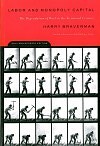February 2000 (Volume 51, Number 9)
Notes from the Editors
Isaac Deutscher once said that, in dealing with some questions, Marxists have to wear gloves. If memory serves, he was talking particularly about the nationalisms of the oppressed. | more…
Isaac Deutscher once said that, in dealing with some questions, Marxists have to wear gloves. If memory serves, he was talking particularly about the nationalisms of the oppressed. | more…
Recently, we were talking about the environment to a well-known sociologist and got into a fairly heated debate about the ecological effects of capitalism. He insisted that capitalism has nothing to do with it. All human practices, he said, inevitably affect the natural environment and have done so since the dawn of history. This seemed to us a pretty simplistic and ahistorical argument | more…

This widely acclaimed work, first published in 1974, overturned the reigning ideologies of academic sociology and became the standard text for many basic areas of sociological inquiry, including the science of managerial control, the relationship of technological innovation to social class, and the eradication of skill from work under capitalism. | more…

The Marxian Imagination is a fresh and innovative recasting of Marxist literary theory and a powerful account of the ways class is represented in literary texts. Where earlier theorists have treated class as a fixed identity site, Markels sees class in more dynamic terms, as a process of accumulation involving many, often conflicting, sites of identity. Rather than examining the situations and characters explicitly identified in class terms, this makes it possible to see how racial and gender identities are caught up in the processes of accumulation that define class. Markels shows how a Marxian imagination is at work in a range of great literary works, often written by non-Marxists. | more…

John Sanbonmatsu’s Postmodern Prince is an work of political theory with a focus on questions of strategy. At the same time it provides an original and illuminating intellectual history of the Left from the 1960s to the present. It examines the politics of the New Left in the 1960s, showing how its expressivism led to political division and also prepared the ground for postmodernism. It shows also how the political economy of academic life in an increasingly commodified society strengthened the basis of postmodernism. | more…
We celebrated our fiftieth anniversary with a dinner on May 7. It was a really marvelous occasion, and we were delighted to see so many of you there. The space was filled to capacity, with 350 people seated, and some who couldn’t get seats at the tables were standing —just to enjoy the atmosphere. We were struck not only by the numbers that turned out but by the terrific spirit that permeated the whole affair. | more…
What a fuss people made about the recent Olympics scandal. You would think the existence of bribery and corruption in the sporting world came as a great revelation, and that people had reason to expect the Olympic games to be immune to practices that are widespread not only in sports but in other commercial enterprises on this global scale.…But there’s still something interesting to talk about here—not so much about the specific case of the Olympics scandal but about the whole idea of corruption. There is something interesting about the moral indignation we’ve been hearing. For that matter, the very notion of corruption is a curious one, really. What does it actually mean? | more…

Is the Internet the springboard which will take universities into a new age, or a threat to their existence? Will dotcom degrees create new opportunities for those previously excluded, or lead them into a digital dead-end? From UCLA to Columbia, digital technologies have brought about rapid and sweeping changes in the life of the university—changes which will have momentous effects in the decade ahead. | more…

The political economy of toxic waste was summed up by Lawrence Summers—then chief economist at the World Bank, later U.S. Treasury Secretary—in his notorious claim that poor people live in environments that are, from an economic point of view, not sufficiently polluted. In its ceaseless search for profit, the toxic waste industry now routinely endangers the health of people around the worlds and the planet itself. | more…

The most prolific U.S. labor muralist since the 1940s, Alewitz follows the traditions of Diego Rivera, José Clemente Orozco, and David Siqueiros as well as the early painters of the Russian Revolution. With a demonstrated blend of artistic integrity and political commitment, Insurgent Images combines grand historical themes with enlivening detail, to illustrate the interplay between personality and event. Alewitz brings to this tradition his own rich sense of irony, humor, and fantasy to illuminate the hidden spaces where connections between the workforce of the U.S. and its extended relatives across the planet are to be found. | more…

Socialist feminist theorizing is flourishing today. This collection is intended to shows its strengths and resources and convey a sense of it as an ongoing project. Not every contribution to that project bears the same theoretical label, but the writings collected here share a broad aim of understanding women’s subordination in a way which integrates class and gender—as well as aspects of women’s identity such as race, ethnicity, and sexual orientation—with the aim of liberating women. | more…

“This book spans a period of forty years, from my entering jail in March of 1949 to November of 1989, when the Berlin Wall came down. It touches nine presidencies—all dominated by the Cold War. That long period contained some of the most traumatic events in the history of the United States: the assassinations of John F. Kennedy, Robert Kennedy, Martin Luther King, and Malcolm X, as well as the wars in Korea and Vietnam.” | more…
Notifications